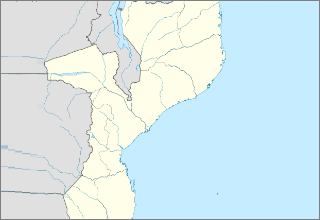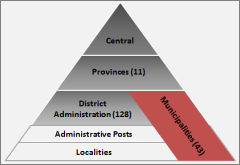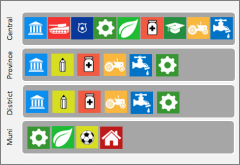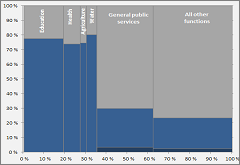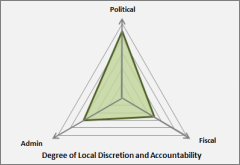Country Profile Background
Prior to the adoption of its 1990 Constitution, Mozambique was governed in a highly centralized manner as a result of the centralized administrative structures inherited from its period of colonial rule as well as its own post-independence socialist experiment. Following the Rome Peace Accords which ended the civil war in 1992, the country has embarked on a decentralization process which combines the deconcentration of key public services to provinces and districts (governed by the Law on the Local Organs of the State, 2003) with the simultaneous process of devolution of urban services to elected municipalities in the country’s urban areas. The main challenge to more fundamental reform has been the tendency of the dominant-party state to pursue a gradual approach to decentralization.
Organizational/Governance Structure of the Public Sector
The Law on the Local Organs of the State (Law 8/2003) sets forth the organization, competencies and functioning of Provinces, Districts, Administrative Posts and Localities as deconcentrated state organs, following a territorial approach to deconcentration. Provinces have elected councils, but they have little or no real authority over the functioning (or financing) of state organs within their province. While Law 8/2003 designates the district level as “the principal territorial unit for the organization and functioning of the local administration” and the base for planning the “economic, social and cultural development of the Republic of Mozambique”, the ability of district official to make decisions continues to be low. In contrast, the country’s municipalities (which increased over time from 33 in 1997 to 53 in 2013) have their own elected leadership and -in principle- have a considerable degree of political autonomy and discretion to deliver urban public services.
Functional Responsibilities of the Local Public Sector
Many public services, including basic education, health, agriculture, and rural water supply, are provided by provincial and district-level departments. Central-level line ministries often play an important role in providing capital infrastructure across these services, while provincial-level departments retain control over the administration of local-level public servants. Municipalities are assigned a number of statutory responsibilities related to urban public services and urban infrastructure development, although urban drinking water is provided by urban water authorities under control of the central ministry. In Maputo, the responsibility for key public services (such as basic education and health services) has been delegated from the state administrtaion to Maputo Municipality.
Fiscal Profile of the Public Sector
Mozambique’s national budget has a transparent structure, which clearly identifies all central and deconcentrated budget allocations by organization and sector, as well as by administrative level and jurisdiction (province and district). The national budget does not include (or provide information on) municipal expenditures or revenues (beyond the level of grant funding provided to municipalities).
Almost half (44.1%) of public sector expenditures in Mozambique take place within the local public sector. About one quarter (26.8%) of total public expenditures take place at the provincial level; 6.5% at the district level; and 1.9% at the municipality level. This reflects the functional responsibilities assigned to local government. In addition to these deconcentrated and devolved expenditures, 8.9% of total public expenditures are made by central government ministries for public services that are delivered at the local level. The national government retains 55.9% of public sector resources for national functions and activities that fall outside the local public sector.
Revenues collected by provinces and districts are not retained subnationally and flow into the national treasury. Municipalities are permitted to collect several municipal taxes and other local revenues. However, these revenue sources remain under-utilized. In addition to own source revenues, municipalities receive some formula-based recurrent and capital grants from the central government, known as grants from the Municipal Compensation Fund and the Investment Fund for Municipal Initiatives, respectively.
Institutional Profile of the Local Public Sector
As deconcentrated levels of public administration, provinces and districts in Mozambique do not enjoy any significant degree of political or fiscal autonomy. Likewise, even though they are responsible for delivering key public services, the degree of administrative discretion that they have is rather limited. At the municipal level (see graph), local governments have a somewhat greater degree of political and administrative autonomy. Fiscally, municipalities have the authority to collect own source revenues and they receive formula-based grant transfers, but they do not have the authority to borrow without central government approval.
Country Profile Information
Complete LPS Country Profile: Mozambique (PDF)
Complete LPS Country Profile: Mozambique (XLS)

